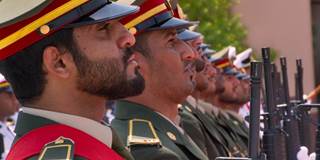The recent framework agreement on Iran's nuclear program represents progress on one major security challenge in the Middle East. But, as some Arab countries move to establish a joint military force, another security question is emerging: Will such an alliance leave the region better or worse off?
LONDON – The framework nuclear agreement that Iran and the P-5 (China, Britain, France, Russia, and the United States) plus Germany recently reached represents progress on one major security challenge in the Middle East. But, as some Arab countries move to establish a joint military force, another security question is emerging: Will such an alliance leave the region better or worse off, particularly given today’s growing Sunni-Shia divide?

LONDON – The framework nuclear agreement that Iran and the P-5 (China, Britain, France, Russia, and the United States) plus Germany recently reached represents progress on one major security challenge in the Middle East. But, as some Arab countries move to establish a joint military force, another security question is emerging: Will such an alliance leave the region better or worse off, particularly given today’s growing Sunni-Shia divide?